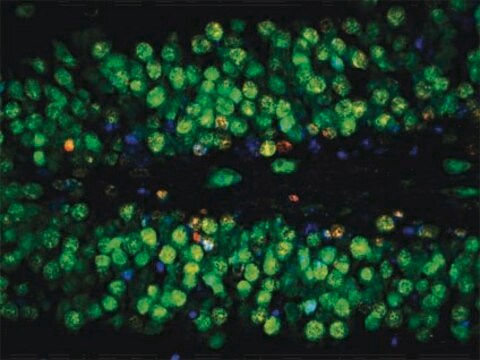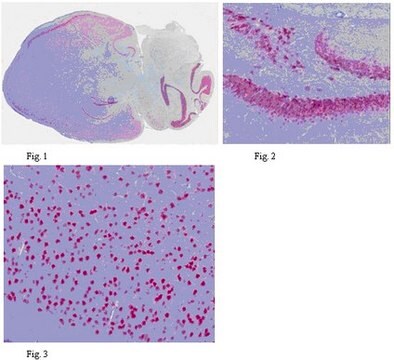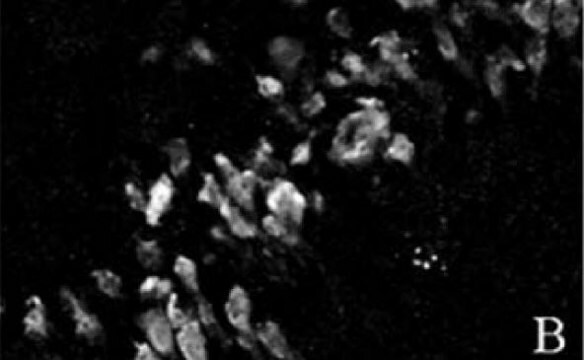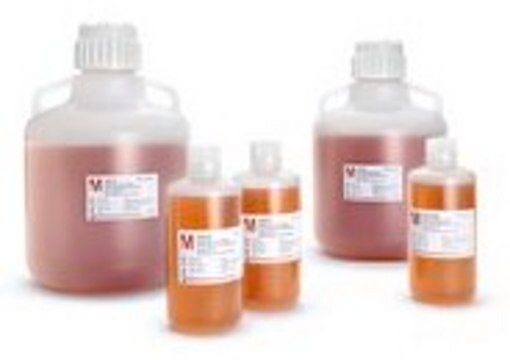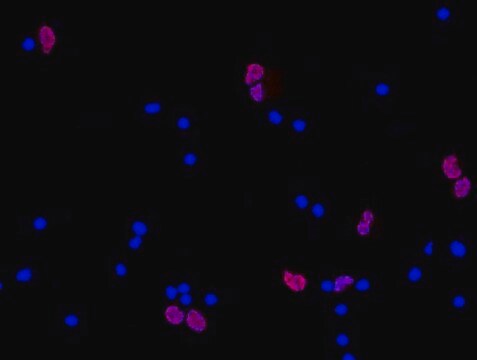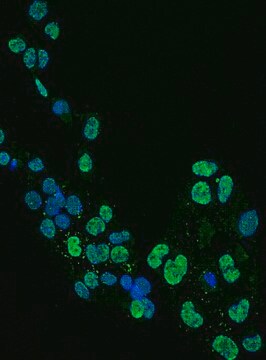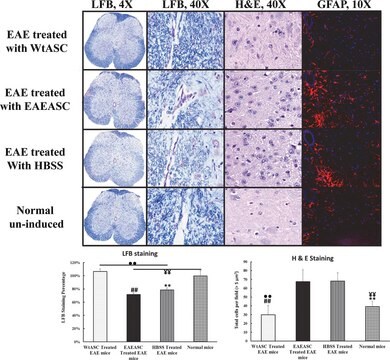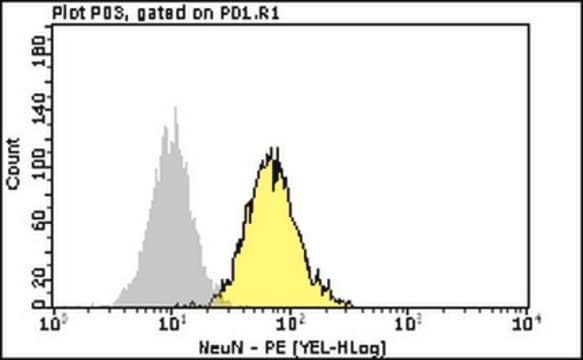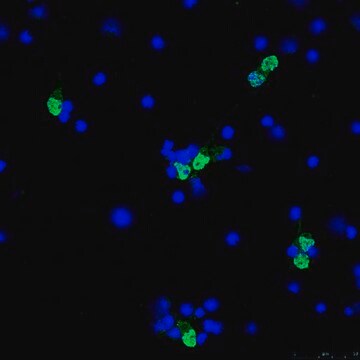おすすめの製品
由来生物
mouse
品質水準
結合体
ALEXA FLUOR™ 555
抗体製品の状態
affinity isolated antibody
抗体製品タイプ
primary antibodies
クローン
A60, monoclonal
化学種の反応性
rat, mouse
テクニック
immunocytochemistry: suitable
immunohistochemistry: suitable
アイソタイプ
IgG1
輸送温度
wet ice
ターゲットの翻訳後修飾
unmodified
遺伝子情報
mouse ... Rbfox3(52897)
rat ... Rbfox3(287847)
詳細
NeuN抗体(神経核、クローンA60)は、すべての試験対象脊椎動物のほとんどのCNSおよびPNS神経細胞タイプに存在する、DNA結合ニューロン特異的タンパク質NeuNを特異的に認識します。NeuNタンパク質の分布は一見して、胎児と成体のいずれの脳においても神経核、周核体および一部の近位神経突起に限られますが、次に示す一部のニューロンはすべての年齢においてNeuNによって認識されません:INL網膜細胞、カハール・レチウス細胞、プルキンエ細胞、下オリーブ核および歯状核ニューロン、および交感神経節細胞など(Mullen et al., 1992; Wolf et al., 1996)。免疫組織染色的に検出可能なNeuNタンパク質は、ニューロンの細胞周期からの離脱および/またはニューロンの末端分化の開始に相当する発達時点で初めて出現します(Mullen et al., 1992)。免疫活性は、E9.5のあたりでマウス神経管に見られ、E12.5までは神経系の発達全体を通して広範囲です。強い核染色は核調節タンパク質機能を示唆しますが、NeuNタンパク質抗原が遠位細胞質で機能しているのか、または核に戻る前にそこで合成されただけなのかに関するエビデンスは今のところありません。精製核から単離されたタンパク質と、イムノブロッティングでの全脳抽出物との間に違いは見られません(Mullen et al., 1992)。
アプリケーション
この抗NeuN抗体 クローンA60、Alexa Fluor 555結合体は、 NeuNの検出についてICCおよびIHCでの使用が検証されています。
免疫組織染色: 希釈倍率1:100で使用、ラット成体脳凍結切片中のNeuNを検出できます。
品質
ラットE18初代皮質細胞において免疫細胞染色により評価済み。
免疫組織染色:希釈倍率1:100で使用、ラットE18初代皮質細胞中のNeuNを検出できます。
免疫組織染色:希釈倍率1:100で使用、ラットE18初代皮質細胞中のNeuNを検出できます。
ターゲットの説明
非結合型親抗体(カタログ番号:MAB377)は、観測される分子量が46~48 kDaの範囲にあり、おそらく別のバンドが約66 kDaにあります。
その他情報
非結合型抗NeuN抗体は、ヒト、フェレット、ニワトリ、鳥類を含むさまざまな動物種で作用することが示されています。
法的情報
ALEXA FLUOR is a trademark of Life Technologies
適切な製品が見つかりませんか。
製品選択ツール.をお試しください
保管分類コード
12 - Non Combustible Liquids
WGK
WGK 2
引火点(°F)
Not applicable
引火点(℃)
Not applicable
適用法令
試験研究用途を考慮した関連法令を主に挙げております。化学物質以外については、一部の情報のみ提供しています。 製品を安全かつ合法的に使用することは、使用者の義務です。最新情報により修正される場合があります。WEBの反映には時間を要することがあるため、適宜SDSをご参照ください。
Jan Code
MAB377A5:
試験成績書(COA)
製品のロット番号・バッチ番号を入力して、試験成績書(COA) を検索できます。ロット番号・バッチ番号は、製品ラベルに「Lot」または「Batch」に続いて記載されています。
この製品を見ている人はこちらもチェック
Madeleine Reilly et al.
Scientific reports, 12(1), 9493-9493 (2022-06-11)
There is an urgent need to develop disease-modifying therapies to treat neurodegenerative diseases which pose increasing challenges to global healthcare systems. Prion diseases, although rare, provide a paradigm to study neurodegenerative dementias as similar disease mechanisms involving propagation and spread
Ángeles Montilla-García et al.
Neuropharmacology, 125, 231-242 (2017-08-02)
Grip strength deficit is a measure of pain-induced functional disability in rheumatic disease. We tested whether this parameter and tactile allodynia, the standard pain measure in preclinical studies, show parallels in their response to analgesics and basic mechanisms. Mice with
Corey G Duke et al.
eNeuro, 7(1) (2019-12-28)
Blue wavelength light is used as an optical actuator in numerous optogenetic technologies employed in neuronal systems. However, the potential side effects of blue light in neurons has not been thoroughly explored, and recent reports suggest that neuronal exposure to
Anna-Kate Fowler et al.
The Journal of biological chemistry, 287(52), 43533-43542 (2012-11-03)
The brain is one of the major targets of chronic alcohol abuse. Yet the fundamental mechanisms underlying alcohol-mediated brain damage remain unclear. The products of alcohol metabolism cause DNA damage, which in conditions of DNA repair dysfunction leads to genomic
Jaycie L Loewen et al.
Journal of neuropathology and experimental neurology, 75(4), 366-378 (2016-03-06)
It is estimated that 30%-40% of epilepsy patients are refractory to therapy and animal models are useful for the identification of more efficacious therapeutic agents. Various well-characterized syndrome-specific models are needed to assess their relevance to human seizure disorders and
ライフサイエンス、有機合成、材料科学、クロマトグラフィー、分析など、あらゆる分野の研究に経験のあるメンバーがおります。.
製品に関するお問い合わせはこちら(テクニカルサービス)